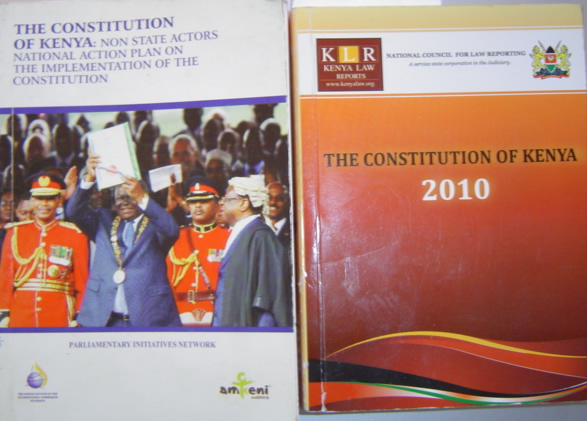Trouble Brewing in Zimbabwe – Constitution-Making in Crisis
Everyone knew that the constitution-making process in Zimbabwe would be fraught with tension as the two MDC formations and ZANU-PF battle out the terms of the country’s new Constitution. Much has been said about the futility of this process since ZANU-PF repeatedly indicated its eagerness to go into elections under its current Constitution. But much can be said for the clever shenanigans of the ZANU-PF negotiating team which appears ‘hell bent’ on creating a deadlock in the process.
Below are some of the less well-known aspects of ZANU-PF’s constitutional-drafting endeavours that came to light this week.
Some background first – in July 2012, the official constitution-drafting body, COPAC, published the second draft Constitution – something that can best be described as a negotiated settlement between the key parties after a politically motivated community consultation process. The draft Constitution did not bode well for the interests of ZANU-PF officials, so with a good dose of confidence, they rewrote the document to their liking and presented it with fanfare to COPAC and the nation. Of course this flouted the entire purpose of democratic constitution-drafting and lead to the MDC formations declaring a deadlock – thereby strengthening ZANU-PF’s argument for the need to go into elections under the current constitution, exactly what they wanted.
ZANU-PF‘s constitutional drafting is an absolutely fascinating read, revealing much of the inner psyche and paranoia of the party, and also their political skill and determination to hold on to power.
The first strategy of the Party focused on amending the draft Constitution to afford more power to the President – essentially, the amendments limits executive power to the President allowing him to do anything he wants without the need for consultation or accountability. According to ZANU-PF, Vice-Presidents should not be elected, but appointed by the President and they should be accountable to the President and not parliament. The amendments have removed any purpose in having a Cabinet or Speaker of Parliament. If ZANU-PF had their way, the President would also effectively be able to veto all Bills which they do not agree with. And when the President dies, or becomes incapacitated, his party can decide which of the Vice-Presidents should take over.
Giving the President more power is in direct contrast to the previously discussed proposal of devolution of power to lower structures and communities. This concept was widely supported by communities during the constitution-drafting process and included in the draft Constitution. Needless to say, devolution of power is not supported by ZANU-PF and was accordingly not included in their amended draft version of the Constitution.
The second strategy seems a calculated move to show their benevolence. ZANU-PF has inserted deliberate points aimed at appeasing communities who might be upset by the increased authoritarianism of ZANU-PF’s draft Constitution, for example:
• A new section has been inserted providing for the economic empowerment of war veterans;
• Youth between the ages of 15 and 35 are entitled to various rights in the amended version, including education and training (in addition to the rights already provided for children up the 18 years of age) and a separate right to sport and recreation has also been added to the Constitution;
• ZANU-PF’s amendments reduce the age of elderly from 70 years to 65 years and include access to free health care for the elderly.
The third strategy appears to be to limit international influence over ZANU-PF’s vision of an autocratic state. ZANU-PF has sought to delete, or ‘water down’ provisions aimed at applying international law to Zimbabwe. They deleted the provision providing for domestication of international instruments. To ensure that constitutional provisions cannot be given a broad interpretation, the party removed every phrase in the draft Constitution which referred to an “open, just and democratic society”. ZANU-PF also included a phrase allowing rights to be restricted based on “national security”.
The fourth strategy looks like typical electioneering politics, trying to appease conservative, traditional and religious sectors, and force the opposition to come out in support of minority groups. If ZANU-PF had their way, freedom to demonstrate and broadcast would be restricted to citizens and permanent residents. Dual citizenship is prohibited, and a foreigner married to a Zimbabwean can only obtain permanent residency after ten years, as opposed to the current requirement of five. The broad right to make decisions on reproduction included in the draft Constitution has been deliberately limited in ZANU-PF’s amended version to decisions on contraceptives, child-spacing and family-size. From the right to privacy, ZANU-PF has deleted the right not to have one’s health condition disclosed. Similarly, from freedom of the press, they have removed the protection of confidentiality of journalists’ sources. Finally, the status of traditional leaders is further strengthened. Specifically, ZANU-PF’s amendments remove the clause in the draft Constitution which prohibited traditional leaders from acting in a partisan manner, participating in political parties or violating the fundamental rights of persons.
As part of their fourth strategy, to present themselves as a ‘morally pure’ party, ZANU-PF has gone on an all-out attack on gays and lesbians. The organisation Gays and Lesbians of Zimbabwe (GALZ) has been experiencing increased harassment for the past two weeks, with disruption of their meetings, assaults on their members, repeated arrests of members and staff, and raids on their offices. As part of this move, ZANU-PF’s draft amendments to the Constitution explicitly ban same-sex marriage and prohibit “homosexuality, gays and lesbian practices”. Whatever this unwieldy clause might mean, it suggests a full onslaught on people based on their sexual orientation and gender identity in the run-up to the elections.
As everyone holds their breath to see what will happen, the deadlock is an ominous sign of a party in crisis, holding on to their power with determination.
Written by Anneke Meerkotter, lawyer at the Southern Africa Litigation Centre
www.southernafricalawcenter.org










